-
Current Job Vacancies
Martin Goetze and Dominic Gwynn Ltd. are looking to recruit two full-time organ builders based at our workshops on the Welbeck estate in North Nottinghamshire.
Martin and Dominic founded Goetze and Gwynn in 1980, with the aim of making authentic organs which were suitable for the music they were used for, to revive interest in the classical English organ, and to restore organs using the same considered approach and methods as were used on objects in museum conservation departments. Edward Bennett joined them in 1985, when they moved to the Welbeck estate.
As they expanded, they took on apprentices and other staff, and maintained a strong reputation for training people and producing high-quality instruments and restorations.
In the past, Goetze and Gwynn functioned very well as a democratic workplace, with the tasks needed for running the firm shared between the three directors. The work was organised according to their strengths and interests, with them taking turns designing or planning and managing projects.
Now, we are looking to re-create this. As the firm’s current main director, Rob would like to recruit people who could potentially help to establish a similar dynamic to this ‘old firm’.
We therefore have opportunities for committed organ builders to join Goetze and Gwynn, both to build and restore wonderful organs, and to share in shaping the firm for the future.
The job description:
Based in our modern workshop in North Nottinghamshire, you will carry out a range of organ building, design, training, and management tasks, including helping to bring in new work. We are striving to follow the old model that the founders set up, with the eventual aim of having three senior organ builders playing to their strengths, taking some share of the responsibility of running the firm, and taking on more work from the areas that interest them most. These will be discussed during the interview process, so that the full range of work can be covered by the team. You would be expected to be involved with site work, and with occasional tuning. If you are looking for the next step in your career, while still being involved in all aspects of organ building, this could very well be the job for you.
The main thrust of our search is for bench organ builders, who would also spend some time on administrative tasks: hopefully about 75% bench time. However, if your strengths mean that you would prefer to concentrate on the administrative side of organ building, such as reports, research, and possibly also design, it could be possible to create a position with a larger administrative, and smaller organ building, workload. You would ideally still be involved in many aspects of practical organ building work, particularly during busy periods and peak times on site, and when an extra organ builder is needed.
As we already have considerable skills and experience within the company, and hope to be recruiting people with a wide range of talents, we are able to be flexible about exactly what these jobs entail, so that the right candidates can work to their strengths.
At Goetze and Gwynn, we prefer to do most of our work in-house. As it is a small team, you are likely to be required to do many aspects of organ building at some point, so strong all-round skills are a must, as is the willingness to develop your skills, and learn from others.
The job involves historic restoration and conservation of a diverse range of organs, from the very old, to 1930’s theatre organs and neo-classical instruments; so if you already have well-developed restoration skills, this is an advantage. If you do not, you will receive training in them.
You will provide training to less experienced members of the team, and provide guidance where you have skills and experience that others do not. We would be especially delighted to welcome an organ builder who is passionate about teaching, and who would enjoy teaching organ builders in general, to continue Goetze & Gwynn’s tradition of passing on their knowledge wherever possible.
The administrative side of this role involves working as part of a team, responding to enquiries, visits and reports, communicating with current customers, coordinating subcontractors, stock checking, ordering and purchasing, and other duties as required. This is done with the help of Emma, our experienced and highly-capable administrator. In the absence of other considerations, you would be likely to take on approximately a third of this work.
This job requires a certain amount of research into historic practices, when we come across an old organ and do not yet know exactly how it would have been made. If you are particularly interested in researching historic practices, this could make you a very welcome addition to the team; there is scope within this role for you to do research in addition to what the immediate work requires.
If you have design/CAD experience we would welcome this, as this job has the opportunity to be involved in all aspects of organ design, including designing parts for the organs we restore – historical reconstruction. We have a plotter, and access to CAD software.
We also have the possibility that one of the two organ builders we recruit could be a less experienced organ builder. This would be someone who has completed an apprenticeship or equivalent, who produces work to an excellent standard, and who is ready to move on to the next stage in their career as a thoughtful organ builder who produces work to Goetze & Gwynn’s standards, ideals and style, and who is ready both to learn and to pass on their own knowledge.
At Goetze and Gwynn we enjoy tackling organ projects from a wide range of different styles, from the older instruments (e.g. St Botolph, Aldgate) to new builds (e.g. Odiham), via new builds in old cases (e.g. Trinity College, Dublin), chamber organs both new and old (e.g. Pilning; 2006 private collection), theatre organs (e.g. Blackpool Tower), organs abroad (e.g. Santiago de Compostella; Yonago), and various miscellaneous projects (e.g. Gavioli 87 key organ, Black Forest organ clock) . We have a small amount of tuning and maintenance work, with the option to expand this if we find an applicant who loves this kind of work; but so far we have found that it takes away from our time in the workshop, and we prefer to keep it to a minimum. Our current and future work is national and international, and we have a busy order book through to 2026, with several more clients who are waiting for the final go-ahead from their powers-that-be.
Our current and future project list includes Victorian and Georgian church organ restorations, a Wurlitzer theatre organ in Geneva, work up to 2026 and beyond, a new organ for a UK church, and more projects waiting for signing.
The workshop is set within the Harley Studios, in the Welbeck estate. This is a group of subsidised craft workshops, and Goetze and Gwynn were accepted into the group due to its strong track record for historic restoration, conservation, and “historic” new organs. We are continuing this tradition; we now work with newer organs in addition to the very old ones, and we still restore them according to careful conservation principles where appropriate, using age-appropriate materials and techniques where possible.
The ideal candidate:
Essential:
- Will be an all-round experienced organ builder with a strong track record, or a highly skilled trained organ builder.
- Will have a commitment to learning
- Will have a friendly, cooperative, helpful approach to their work
- Will have good leadership qualities/is willing to work hard on this
- Will have good communication skills/is willing to work hard on this
- Will always strive to do the best work possible
- Will be good at assessing own work; self-correcting; seeking support if necessary
- Will be self-motivated
- Will be willing to work away on site
Desirable:
- A full UK driving licence
- A strong commitment to passing on skills
- Design experience
- Machinery maintenance skills/experience
- A particular area, or areas, of expertise in organ building
- Excellent organisational skills
- Experience of leading projects
- Experience with restoration and conservation
We hope to offer (you have to build some of this, too!):
- A friendly and supportive work environment, where you have the chance to be fairly self-determined, and to develop a team
- A lovely location in central England, with good transport links
- A well-equipped, established, subsidised workshop (3,000 sq ft), with a machine room, main workshop, drawing room, and metal shop/voicing shop
- A competitive salary, dependent on experience
- 25 days of holiday per year, plus Bank Holidays
- Flexible hours – 40 hours per week as standard
- The chance to bring on board your own (appropriate within the ethos of the firm) projects, and to tackle them with a team
If you are interested in applying to work at Goetze & Gwynn, and would like to discuss it further, please talk to Rob Balfour-Rowley in confidence: 01909 485 635, or rob@balfour-rowley.co.uk; or email the workshop: office@goetzegwynn.co.uk
To apply for this job, please send a cover letter and CV to Rob Balfour-Rowley: rob@balfour-rowley.co.uk; or by post to, Martin Goetze and Dominic Gwynn Ltd, Units 1-2 East Workshops, Welbeck Estate, Worksop, Notts, S80 3LW
-
Opening concert at Canolfan Soar
The opening concert for the Peter Conacher organ at Canolfan Soar in MT last Saturday September 23rd 2023. William Reynolds played the organ in a program including the South Wales Clarinet Choir, Con Voce Choir, the tenor Rhys Meirion and Delyth and Bethan McLean, daughters of Liesbeth, director of the centre. Excellent music making.

-
Italian Organ at St Andrews University
The Italian Organ has been at St Andrews University since mid July and has been used extensively for teaching and for concerts by Massimiliano Guido and Giovanna Riboli during St Andrews Organ Week in early August 2023.

-
The Handel House organ moves to 25 Brook Street
The Handel House organ has moved to the Handel and Hendrix Museum at 25 Brook Street, London. It is in Handel’s Fore Parlour as shown in the pictures. The link to the museum is https://handelhendrix.org/

-
St Teilo organ at Lincoln Cathedral

The St Teilo organ is at Lincoln Cathedral. It will be used in the upcoming festival to commemorate the 400th anniversary of the death of William Byrd (who was the organist at Lincoln between 1563 and 1572). The festival runs from 30th June to 4th July. It will also be used both for voluntaries and to accompany the choir.
-
The Wingfield Organ at Bradford Cathedral
A recording of the debut live performance of “Duet, Aria and Fughetta on Bradford”, composed by Sarah MacDonald and played by Imogen Morgan, commissioned for, and recorded live, on International Women’s Day 2023. The link is as follows : https://youtu.be/0IqgQ7m6Irc
The Wingfield Organ is currently at Bradford Cathedral bradfordcathedral.org.uk

-
Happy New Year
We at Martin Goetze and Dominic Gwynn Ltd, wish you a very happy and prosperous New Year, as we embark on a vey busy period. We welcome new staff, customers and friends to the workshop with varied projects including Georgian recreations, Victorian restorations and maintaining and restoring mighty Wurlitzers.

-
The Wurlitzer pedalboard completed

The restoration of the pedalboard of the Wurlitzer theatre organ of the Thursford Collection in Norfolk
-
Wurlitzer pedal board

The restoration of the pedalboard of the Wurlitzer theatre organ of the Thursford Collection in Norfolk
-
The Wurlitzer pedalboard

The restoration of the pedalboard of the Wurlitzer theatre organ of the Thursford Collection in Norfolk
-
Restoration of the pedalboard of the Wurlitzer theatre organ at Thursford

The restoration of the pedalboard of the Wurlitzer theatre organ of the Thursford Collection in Norfolk
-
The Compton Minatura chest re-leathered

A Compton Minatura chest completely re-leathered, with many of the pouch coil springs having to be replaced because the originals were rusted and brittle.
-
Theatre organ in Lincolnshire

Private residence Theatre organ in Lincolnshire. Restoration work after water damage.
A unit chest for the Vox Humana with a new side wall
-
Re-leathering relays on the Wurlitzer
Most recently Chris and Rob have just returned from a week of maintenance on the famous Wurlitzer organ of the Thursford Collection in Norfolk, re-leathering the grey key relay secondary motors.

-
Two weeks in Geneva
Then again at the end of March, we had two weeks in Claparède College in the suburbs of Geneva in Switzerland, the home of the former Granada Cinema, Clapham Junction, 3 manual 8 rank Wurlitzer organ from 1937


-
Theatre organ work
So far 2022 has had quite a lot of theatre organ work, beginning in January with two weeks maintenance on the world famous 1935 Tower Ballroom Blackpool Wurlitzer organ.

-
This year’s Christmas Card
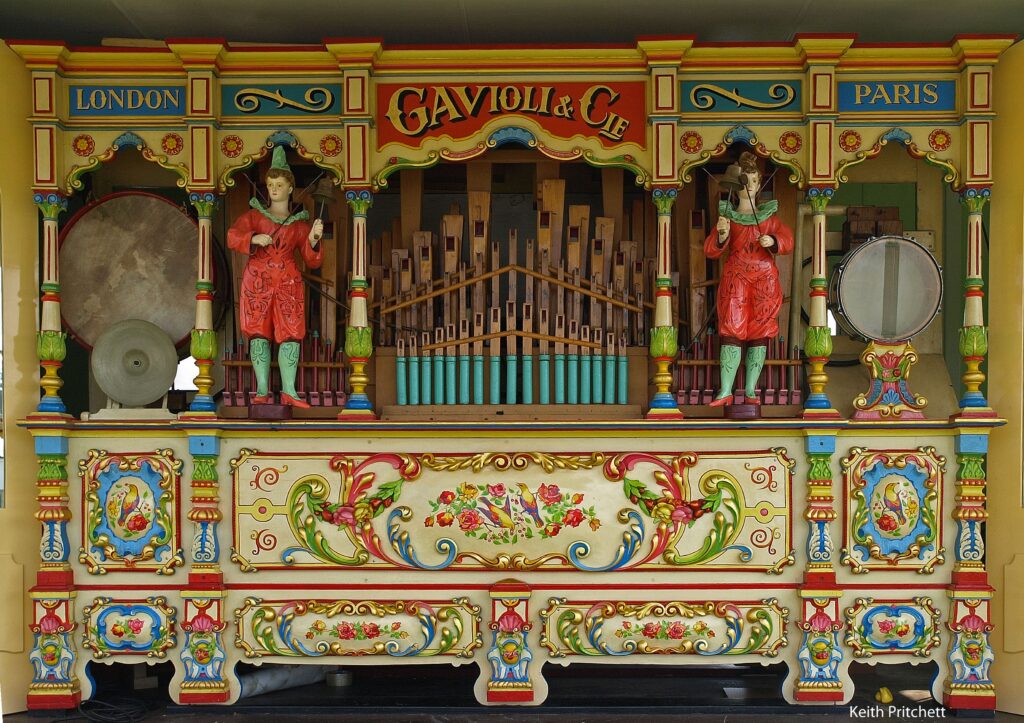
LATE 1890s 87 KEY GAVIOLI
This organ was built in the 1890s and was housed in the three-abreast gallopers on the sea front at Mablethorpe Lincolnshire, owned at the time by the Gray family. These instruments were built to represent a medium-sized orchestra, the main sounds being trombones, saxophones, violins, clarinets and piccolos. The opulent decoration and the gaudy colours, like the interiors of the musical theatre and gin palaces, were designed to attract the newly-leisured lower classes, a mirror to the luxury of the rich.
It was purchased in the 1960s in very poor condition and restored by former Chiappa employee M. Rooney. Chiappa were Britain’s main importer and manufacturer of mechanical instruments throughout the 1800s and 1900s. They are still trading today, making punched cardboard music from their works in Eyre St Hill, London. The organ is now owned by the Bishton family of showmen, who still use the organ for its original purpose, which is to attract custom to their ‘old-time’ vintage fair.
It has undergone major mechanical and pipe restoration in the Goetze & Gwynn workshop under the close eye of Stuart Dobbs whose background and interest is in this type of instrument.
-
Access to the pallet box at Lillington
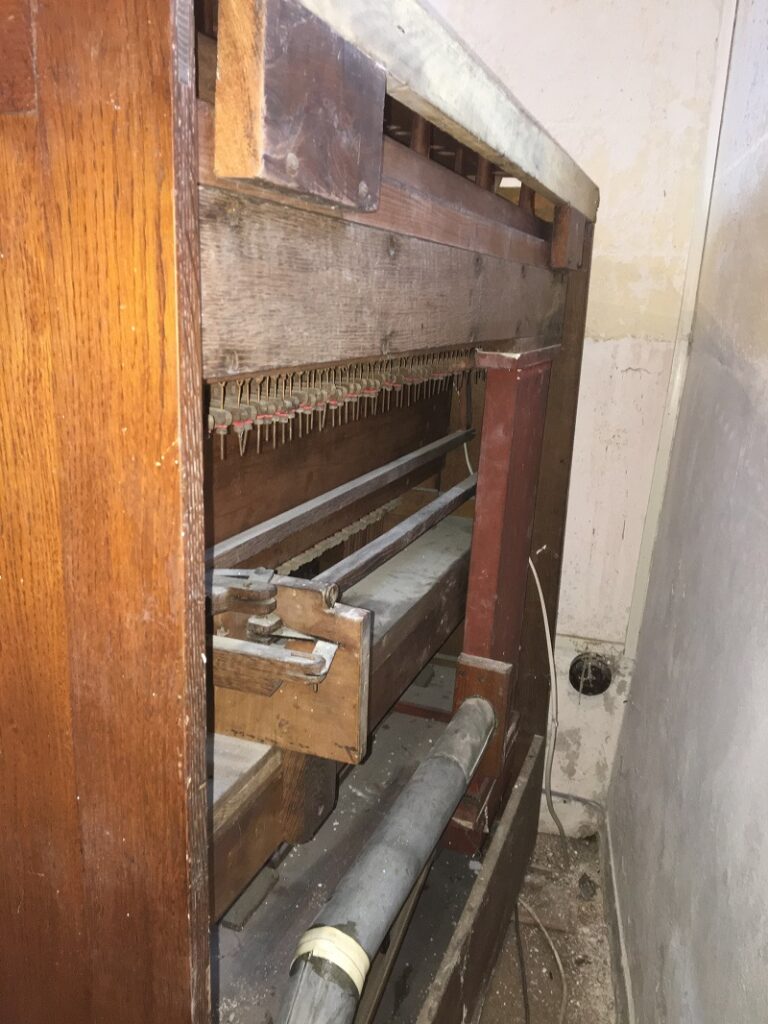
The organ had been moved to the church by John Budgen in 1998, against the wall, so the lower half of the organ had to be moved out for access, and back again to connect with the blower.
-
New pallet springs fitted into the Lillington organ
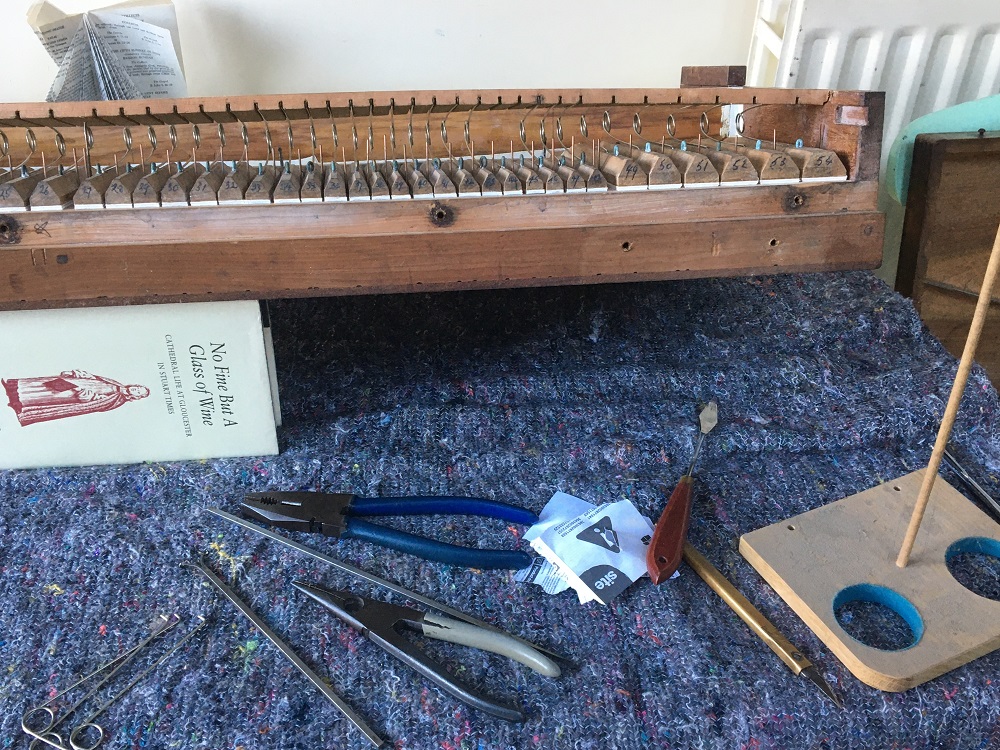
New pallet springs fitted into the Lillington organ
-
Dominic making new springs for the Lillington organ

I enjoy making pallet springs on the jig which Martin made in 1980. It demands a degree of dexterity and over forty years of experience…
-
Corrosion in the Lillington organ’s pallet box

Why some yellow pine seems to be so corrosive, and others not, is from the user’s point of view a mystery. Presumably ‘yellow pine’ from North America, as bought from the timber merchant, is a generic term for many varieties, some corrosive, most not.
-
Lillington corroded pallet spring

The organ at Lillington near Sherborne in Dorset was made by T.C.Bates in about 1840. It is a four stop organ, with swell front and short pedalboard, but most ingeniously a drop-down dumb organist to replace the human one, the barrel playing the keys. The reason for the ciphers was the corrosion of the pallet springs, which had in places completely disappeared, presumably because of corrosive agents in the yellow pine pallets.
-
Thomas Mace organ as far as it has got…

A picture of Edward’s great nephew Oscar Bennett with the wind chest and the pipes (racked in by Oscar). Unfortunately the project has stalled, until more funding is forthcoming and a stimulus towards a different home than the flying music room, which may not now happen.
-
Tracker offcut Christmas trees

Christmas encourages creativity – an abundance of offcuts from the trackers for the Peter Conacher organ at Merthyr Tydfil stimulated another set of coloured Christmas trees
-
Swan Singers with the Wingfield Organ
At the beginning of December the traditional crib festival was held at St Cuthberts Wells (200 model cribs of varying materials and styles from round the world) with music provided by a wide variety of musicians, including a Wells chamber choir (including Antonia Gwynn and for this occasion Dominic) and with music from the Wingfield organ played by Julian McNamara and blown by choir members
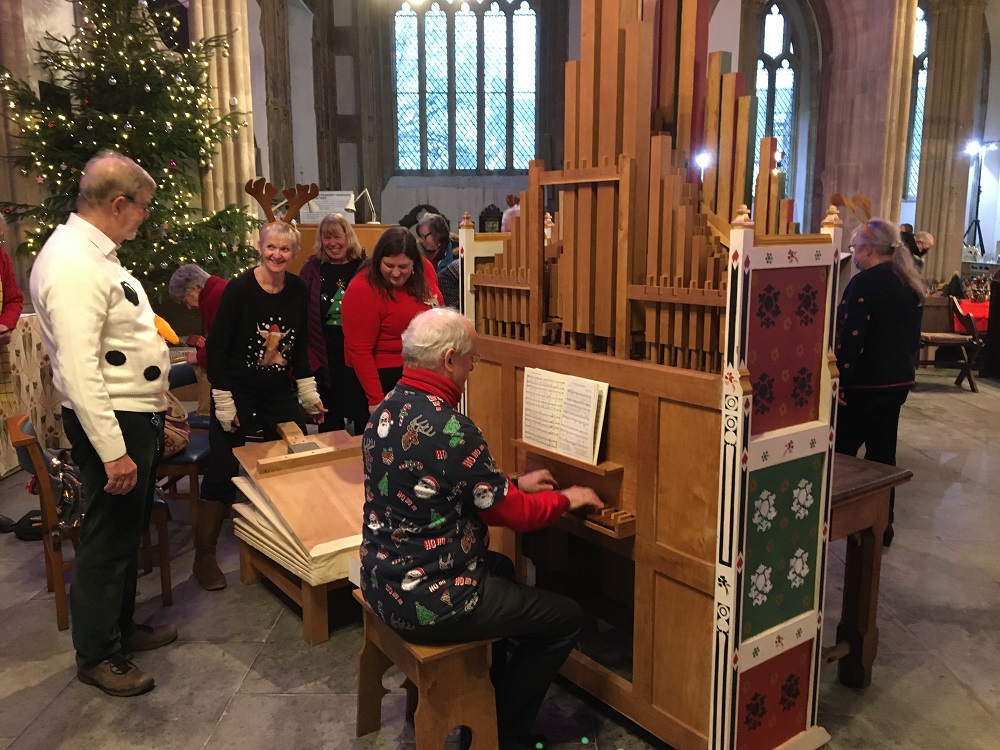
-
Margaret Phillips plays Art of Fugue
On Thursday November 25th at 6.00pm Margaret Phillips will play movements of J.S.Bach’s Art of Fugue on the Richards Fowkes organ at St George’s Hanover Square, to launch her new CD. It is an excellent organ for the music, and Margaret’s playing reveals its inspiration.

-
Concert at St Peter Pilning
On November 6th members of Ystradivarius, see https://ystradivarius.com/, gave a lovely concert of baroque music with the William Allen chamber organ, with John Cheer playing the organ in Handel Organ concertos and Stanley voluntaries. David Lewis violin played a Leclair sonata, and Claudine Cassidy cello played a capriccio by Joseph dall’Abaco. Thanks to Jonathan and Sharon Edwardes for organising a delightful occasion. The Allen organ looked and sounded wonderful.
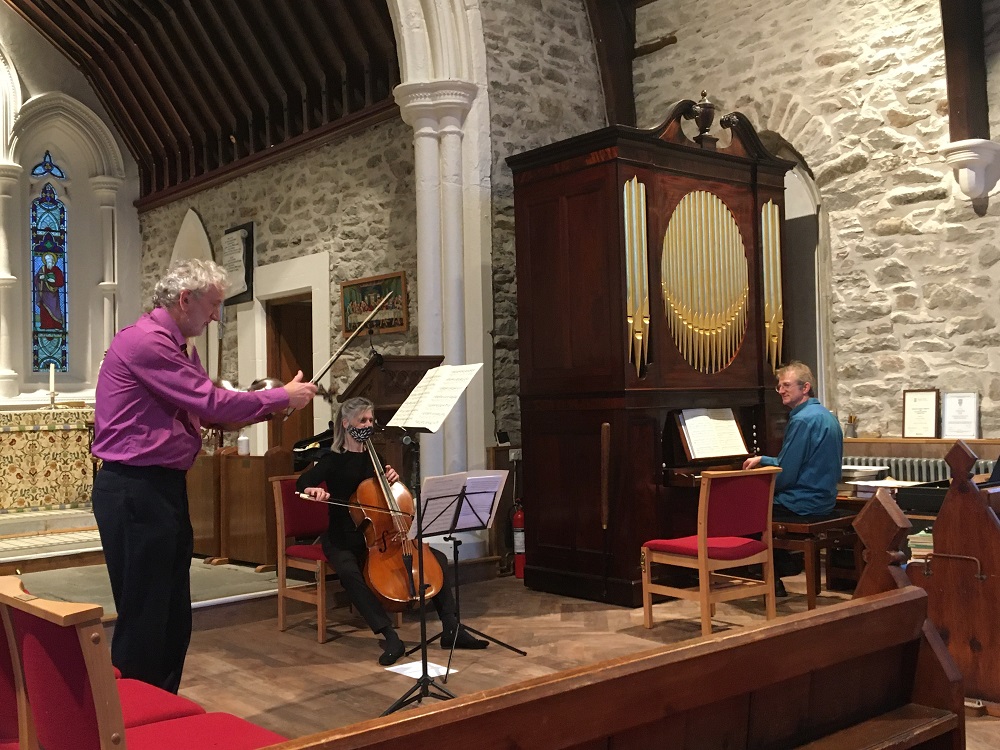
-
Jennifer Bate memorial concert
Jennifer Bate memorial concert

-
Handel House Museum
Dominic helped to move the 1754 Snetzler bureau organ from the Handel House Museum, which is expanding into its ground floor and basement, see https://thehallelujahproject.org/

-
Richard playing his Russell chamber organ
Richard playing his Russell chamber organ

